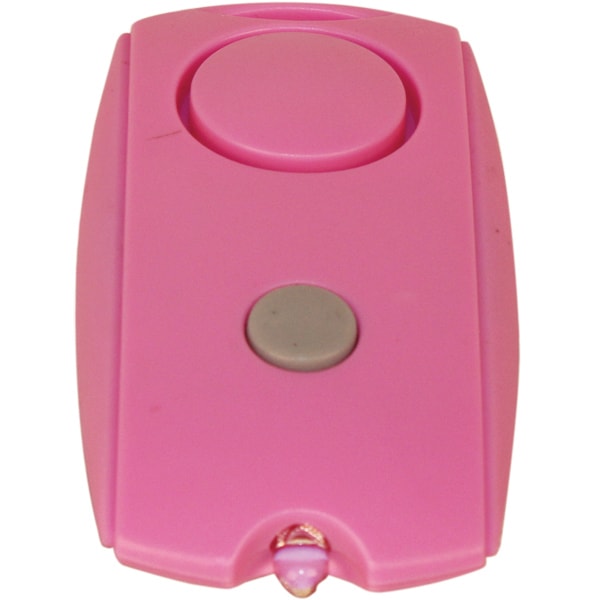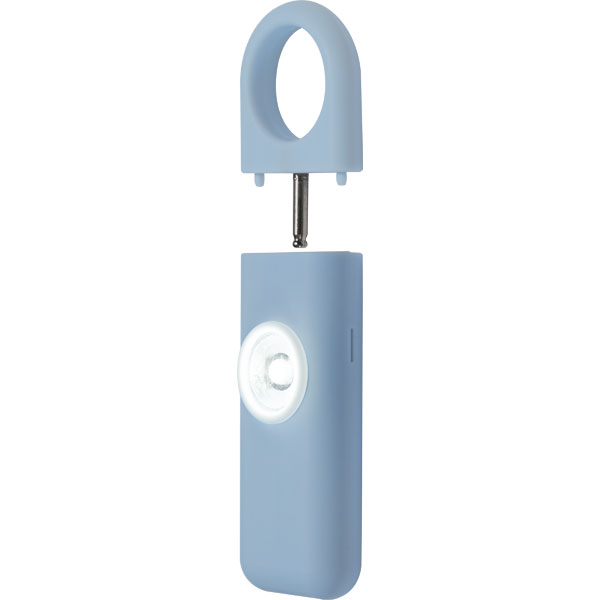
Brainstorm Security Shop

For Orders Over $199

On Any Of Our Products

Details On Refund Page
In the bustling hallways and crowded spaces of your high school, have you ever considered how a personal alarm might bolster your safety? These devices aren’t just for show; they emit a piercing sound that can make all the difference in urgent situations. But beyond the obvious, the impact of carrying such a simple tool extends to your peace of mind and preparedness. You’re probably aware that feeling secure isn’t just about physical safety—it’s about being psychologically ready too. So, how can this small device fit into your daily life, and what might you be overlooking about its potential benefits? Let’s explore that together.
Personal alarms are small, portable devices designed to emit a loud sound, alerting those nearby to potential danger. They’re typically activated by a button or a pull pin, unleashing a piercing noise that can reach up to 130 decibels. This level of sound is comparable to a jet engine taking off, ensuring it captures attention even in bustling environments.
You might wonder about the types available. There are various models, from keychain attachments to those disguised as everyday items like pens or jewelry. This variety means you can choose one that best suits your style and needs without it standing out or looking conspicuous.
Operating these alarms is straightforward. In most cases, you’ll just need to press a button or pull a pin to activate the alarm. Once triggered, the noise continues until you deactivate it, usually by reinserting the pin or pressing the button again. It’s designed this way so that if someone tries to disarm it, they’ll find it difficult, giving you time to move to safety.
Carrying a personal alarm doesn’t require any special training, making it an accessible safety tool. You can keep it in your pocket, bag, or even wear it, ensuring it’s always within easy reach.

While personal alarms enhance your security, understanding the broader topic of student safety is equally important. As you navigate your high school years, being aware of the safety measures and resources available to you is crucial.
From knowing your school’s emergency procedures to being aware of who to contact in unsafe situations, these elements ensure not only your physical well-being but also your peace of mind.
It’s vital you’re equipped with knowledge about staying safe on and off campus. This includes understanding the risks related to cyberbullying, peer pressure, and off-campus activities. By staying informed, you’re more likely to react appropriately in situations that could compromise your safety.
Additionally, fostering a supportive network among your peers can help maintain a safe school environment for everyone.
You’ll find that a personal alarm functions by emitting a loud sound designed to deter attackers and alert nearby individuals. This sound is usually a high-decibel alarm, often reaching up to 130 decibels – comparable to the noise of a jet engine taking off.
The alarm is activated by a simple mechanism, such as pulling a pin or pressing a button, making it easily accessible and straightforward to use in stressful situations.
The device itself is typically small and portable, designed to be carried on a keychain or in a pocket. This makes it convenient for you to carry around as you go about your daily activities, from attending classes to hanging out with friends.
Additionally, some models are equipped with features like flashing lights or the ability to send alerts to a smartphone, enhancing their effectiveness as a safety tool.
To operate the alarm, you don’t need any special training. Once triggered, the loud noise continues until you deactivate it, usually by reinserting the pin or pressing the button again. This functionality ensures that you can draw attention and seek help as quickly as possible.
Using a personal alarm can significantly enhance your safety, providing an immediate deterrent to potential attackers. When you’re walking through less crowded areas or late at night, a loud alarm can make a big difference. It’s not just about the noise; it’s about creating a moment of surprise and hesitation in the aggressor, giving you time to escape or draw attention.
Moreover, personal alarms can boost your confidence. Knowing you’ve got a way to alert others in an emergency can make you feel more secure and less vulnerable. This isn’t just comforting; it fundamentally changes how you move through the world. Whether you’re heading to an after-school activity or just walking home, you’re likely to feel safer and more assertive.
Besides personal safety, these alarms also promote responsibility among your peers. When you and your friends carry personal alarms, you’re collectively more aware and prepared. This shared approach to safety can foster a supportive community atmosphere, where everyone looks out for each other. It’s about empowering you and your friends to take charge of your safety, reinforcing the idea that looking after each other is everyone’s responsibility.
When choosing a personal alarm, it’s crucial to consider several key features to ensure it meets your safety needs effectively.
First, look at the sound level; your alarm should be loud enough to be heard from a distance. Ideally, it’ll emit a sound of at least 120 decibels, which can draw attention and deter an attacker.
Next, consider the alarm’s ease of use. In an emergency, you won’t have time to fumble around. Look for a device that activates quickly and easily, preferably with a simple pull-pin or push-button mechanism. It’s also worth checking if the alarm is easily accessible, like those that can be attached to a keychain or backpack.
Battery life is another important factor. You don’t want your alarm to fail when you need it most. Opt for models with long-lasting batteries, or those that offer easy battery replacement.

Now that you know what features to look for, let’s explore how to select the best personal alarm for your needs. Think about your daily routine and the specific situations where you might feel vulnerable. Are you often out late after extracurricular activities, or do you travel through crowded places like bus stations? These scenarios can help determine which alarm suits you best.
Consider the alarm’s sound level; it should be loud enough to draw attention but not so overwhelming that it startles you too. Typically, alarms range from 100 to 130 decibels. Opt for one that hits at least 120 decibels to ensure it can be heard from a distance.
Size and accessibility are also crucial. You’ll want something compact and easy to carry. Many alarms come with keychains or clips, so you can attach them to your backpack or belt loop for quick access. Look for models that allow you to activate the alarm quickly, ideally with a simple pull or press mechanism.
Lastly, think about durability and battery life. You don’t want your alarm failing when you need it most. Check for a sturdy build and a battery that lasts several years, so you’re always prepared.
To maximize your personal alarm’s effectiveness, follow these straightforward installation and usage tips.
First, you’ll want to fully charge your device before using it. Most alarms come with a USB charging cable, so simply plug it into any USB port or adapter. Once charged, attach the alarm to an easily accessible spot on your bag, belt loop, or keychain. Make sure it’s in a location where you can reach it quickly in an emergency.

Next, familiarize yourself with how to activate and deactivate the alarm. Most models have a simple pull pin or push button. Practice using it a few times so you’re comfortable with the mechanism. Remember, the goal is to use it swiftly if you’re ever in a distressing situation.
Additionally, regularly check the battery level to ensure it’s always ready when you need it. Many alarms have a test function, so use this feature periodically to confirm that your alarm is working correctly.
Lastly, keep your alarm clean and free from dirt and debris which might hinder its performance. A quick wipe with a damp cloth is all you need to keep it in good working condition.
While understanding how to use and maintain your personal alarm is important, you should also be aware of the legal and privacy implications of carrying and using such a device.
First off, it’s crucial to know the local laws regarding the use of personal alarms. Some areas might have restrictions on the sound level or the circumstances under which you can legally use these devices. You don’t want to inadvertently break the law while trying to protect yourself.
Moreover, consider the privacy of others when you activate your alarm. The loud noise doesn’t just alert you and potential helpers; it also captures the attention of everyone nearby. This could potentially invade the privacy of others, especially in quiet, confined spaces. Always ensure you’re using your alarm appropriately and not causing unnecessary disturbance.

It’s also a good idea to check if there are any specific school policies regarding personal security devices. Some schools might have rules about when and where these devices can be used on campus. You’ll need to balance your safety needs with respecting these regulations to avoid any disciplinary actions.
Always stay informed and considerate of how your safety measures impact those around you.
If a personal alarm isn’t suitable, consider other safety measures you can easily carry and use. Pepper spray, for instance, is a compact option that’s effective at deterring an attacker. Make sure it’s legal in your area, and you know how to use it properly to avoid accidental misuse.
Another viable option is a tactical pen. Not only does it function as a writing tool, but it can also be used as a self-defense mechanism. It’s discreet, easy to carry, and can deliver a painful jab that might give you enough time to escape a threatening situation.
You might also want to think about carrying a whistle. While it’s simple, blowing a whistle can create a loud noise that attracts attention and deters an attacker. It’s lightweight and can be attached to your keychain or backpack for quick access.
Lastly, consider taking self-defense classes. They not only teach you physical defense techniques but also boost your confidence and awareness. Knowing you’re capable of defending yourself can be empowering and is a valuable skill that lasts a lifetime.
All these alternatives provide varying levels of protection and can be tailored to fit your comfort and skill level. Choose what feels right for you and stay safe.
You’ve learned how vital personal alarms are for your safety as a high school student. By choosing the right model with essential features, you can effectively deter threats and alert others if you’re in danger. Remember to use and maintain your alarm correctly while respecting legal and privacy guidelines.
Don’t forget, personal alarms are just one part of your safety strategy—stay aware and consider other measures to ensure you’re always protected.

Brainstorm Security Shop
1867 Caravan Trail
Ste 105
Jacksonville, FL 32216
Call us toll free: (800) 859-5566